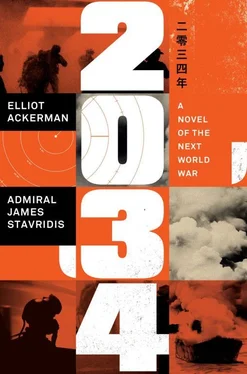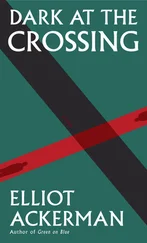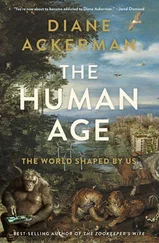Truth be told, Chowdhury’s distancing from America started when he’d resettled his mother and daughter in New Delhi. His mother, who had now reconciled with her aging brother, was reluctant to leave him. And if his mother was reluctant to leave her brother, Chowdhury couldn’t leave his mother—particularly in light of Ashni’s attachment to her grandmother. The girl had already been through so much with the loss of her own mother. This tally of familial obligations led Chowdhury to resign from the administration and stay on in what his uncle insisted on calling “your home country.” Once Chowdhury had made that decision, he was pleasantly surprised to discover that his expertise was in high demand. After the New Delhi Peace Accords, both the political world and business world opened up to him in a way he could never have anticipated. Not only had he served in the highest levels of the US executive branch; he was an India expert (or simply Indian, if the offending party hadn’t read his CV). International lobbyists, think tanks, venture capitalists, sovereign wealth funds—they aggressively courted him with board seats, stock options, and prestigious titles such as “Senior Distinguished Fellow” as they vied for his expertise as part of a general clamor to understand India’s ascendance as an economic and political juggernaut.
For Chowdhury, this meant that he’d had no reason to go back to America. However, packing for this trip, that word, back , came to mind again. Although success after success had come to him since resettling in New Delhi, a certain bitterness remained in how he had left home. How often had he replayed the events of five years before in his mind, wondering if a different set of decisions might have led to a different set of outcomes. He thought of Wisecarver too, whose obstruction of the Indian defense attaché had eventually come to light, a scandal that cost the administration its next election, so that even had Chowdhury stayed on he would’ve soon been out of the job. But none of that had ever alleviated the deeper wound, which wasn’t the loss of life, as tragic as it had been, but rather the sacrifice of America itself, the idea of it.
Chowdhury had packed one suitcase and a carry-on, a daypack he could take when he traveled into the camps. His office at the UN High Commission for Refugees had also advised he bring a sleeping bag. Depending on road conditions and available accommodations, the chance existed that his delegation might need to stay one or two nights in the wretched camps, a detail that Chowdhury kept from his mother, who wouldn’t have approved. Cyclical outbreaks of typhus, measles, and even smallpox often sprouted from the unbilged latrines and rows of plastic tenting. These diseases had ravaged communities far and wide, only heightening the cost of the war. Their own hometown of Washington, D.C., had lost nearly fifty thousand residents to a vaccine-resistant strain of rubeola two years before. Chowdhury had wanted to return then to help, but his mother had convinced him not only to remain in New Delhi but to submit his application for Indian citizenship. Which he reluctantly did. “You need to accept that this might be your home,” she had said. Still, he couldn’t quite believe that the America he remembered, the America that Kennedy and Reagan had both called “the city upon a hill,” might vanish.
Except America was an idea. And ideas very seldom vanish.
Whenever he despaired, he reminded himself of this.
With his bags set by the front door, he stepped into his study, which had once been his uncle’s study, the very room where he’d learned of the attacks on Galveston and San Diego. At the corner of the desk sat a photograph of his great-great-grandfather, Lance Naik Imran Sandeep Patel of the Rajputana Rifles. This wasn’t the photo from the Delhi Gymkhana that his uncle had shown him years before, but a photograph from later on in his great-great-grandfather’s life, after his career in the army, once he’d made a modest fortune selling arms during Partition to the newly formed Indian government. Although the forty years between photographs had obscured the resemblance of the young and old versions of the same man, the gaze was unmistakable. It was unrequited, hungry for more—to do more, achieve more, to make a better, safer, more secure, more dignified life. It was, in Chowdhury’s estimation, a distinctly American gaze, though the man had never set foot in America.
When he considered his great-great-grandfather, and considered Reagan and Kennedy—who felt like grandfathers of another sort—and their shared vision of “the city upon a hill,” he felt assured by the notion that America, as an idea, did not depend upon any particular set of borders to endure. In fact, on this UN-sponsored humanitarian trip, he would be doing his part to restore American ideals to its very shores.
Outside, his taxi pulled up. Chowdhury messaged the driver to wait a minute. Another idea rang discordantly in his mind, an idea from another of America’s forefathers. These were words spoken by a young Abraham Lincoln two decades before the calamity that became the American Civil War. All the armies of Europe, Asia, and Africa combined , Lincoln had said, with all the treasure of the earth (our own excepted) in their military chest, with a Buonaparte for a commander, could not by force take a drink from the Ohio or make a track on the Blue Ridge in a trial of a thousand years…. If destruction be our lot we must ourselves be its author and finisher. As a nation of freemen we must live through all time or die by suicide .
A nation of freemen.
Chowdhury counted himself among that nation, no matter where it might exist, in Washington, New Delhi, or elsewhere. And so he would travel back to America, hopeful that the spirit of that nation had yet to abandon the place. He had one last item to pack. Opening his desk drawer, he reached for his two passports: Indian and American, different shades of the same blue.
His hand hovered indecisively over them both. He had a flight to catch. Time was growing short. The taxi began to blare its horn. He stood, the seconds bleeding away. For the life of him, he couldn’t decide which to choose.
“Because no battle is ever won…. They are not even fought. The field only reveals to man his own folly and despair, and victory is an illusion of philosophers and fools.”
—William Faulkner
Elliot Ackerman would like to thank Scott Moyers, Mia Council, PJ Mark, and, as ever, Lea Carpenter.
James Stavridis would like to thank Andrew Wylie, Captain Bill Harlow, Scott Moyers, Mia Council, and the Fleet’s best spouse, Laura Stavridis.
Admiral Jim Stavridis, USN (Ret.)spent more than thirty years in the US Navy, rising to the rank of four-star admiral. He was Supreme Allied Commander at NATO and previously commanded US Southern Command, overseeing military operations through Latin America. At sea, he commanded a Navy destroyer, a destroyer squadron, and an aircraft carrier battle group in combat. He holds a PhD from the Fletcher School of Law and Diplomacy at Tufts University, where he recently served five years as dean. He has published nine previous books. Admiral Stavridis is Chief International Security and Diplomacy Analyst for NBC News, and a columnist at both Time magazine and Bloomberg Opinion. Based in Washington, D.C., he is an operating executive of the Carlyle Group, an international private equity firm.
Elliot Ackermanis the author of the novels Red Dress In Black and White , Waiting for Eden , Dark at the Crossing , and Green on Blue , as well as the memoir Places and Names: On War, Revolution and Returning . His books have been nominated for the National Book Award, the Andrew Carnegie Medal in both fiction and non-fiction, and the Dayton Literary Peace Prize. He is both a former White House Fellow and Marine, and served five tours of duty in Iraq and Afghanistan, where he received the Silver Star, the Bronze Star for Valor, and the Purple Heart.
Читать дальше












